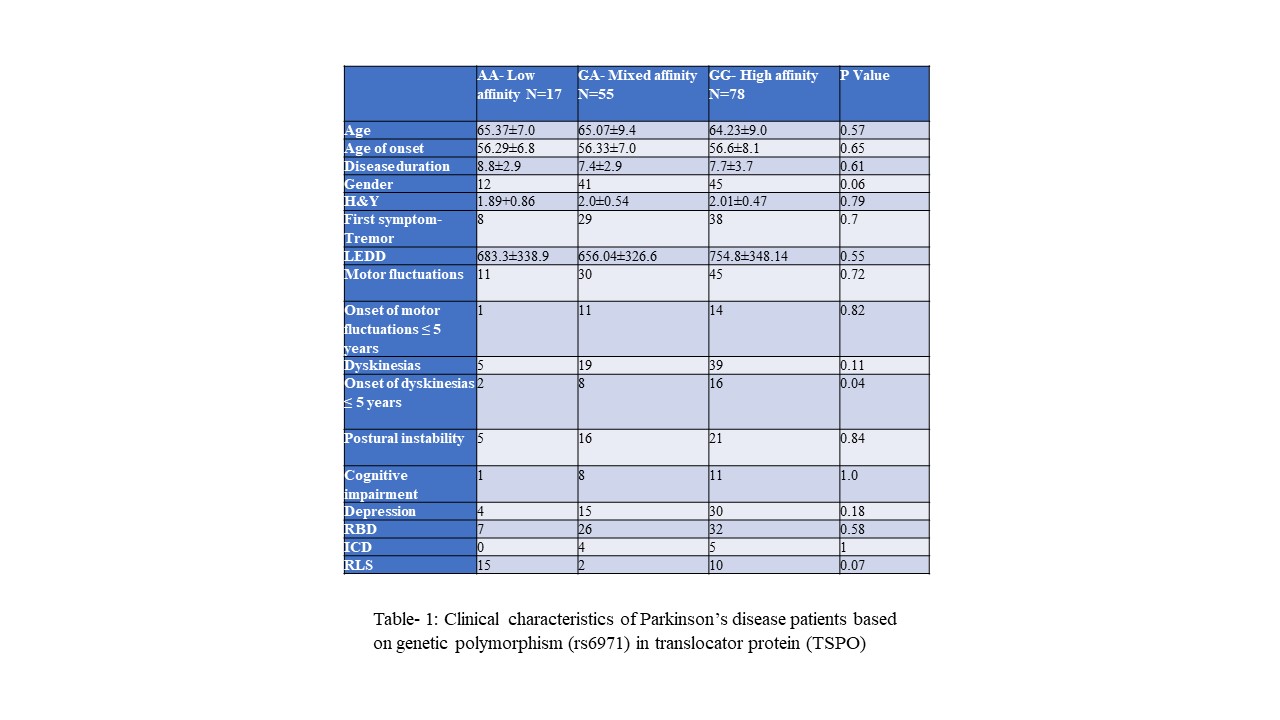Session Information
Date: Monday, September 23, 2019
Session Title: Genetics
Session Time: 1:45pm-3:15pm
Location: Les Muses Terrace, Level 3
Objective: The objective of this study will be to identify specific clinical patterns in Parkinson’s disease patients with respect to TSPO genetic polymorphism (rs69711).
Background: The translocator protein (TSPO) is a mitochondrial protein located in the outer mitochondrial membrane. TSPO has been used as a target for in vivo neuroimaging with PET ligands to study inflammation in Parkinson’s disease and other conditions. The rs6971 polymorphism in translocator protein affects the affinity of TSPO ligands and may have an impact on binding in PET studies, but the clinical significance is unknown. Colasanti et al found that a nominal association between TSPO polymorphism and the diagnosis of bipolar disorder. Pouget et al evaluated the effect of TSPO polymorphism on interindividual variability in anti-psychotics efficacy in schizophrenia. We hypothesized that this polymorphism may influence the clinical presentation of Parkinson’s disease patients as well.
Method: The participants were patients with Parkinson’s disease seen and diagnosed at the DMCBH (UBC Hospital-Pacific Parkinson’s Research Center). We included patients >18 years of age who were evaluated by one of our movement disorders specialists at least once. We excluded patients who did not have complete records of their visits in our database. Clinical data were obtained from the clinic database.
Results: We evaluated a total of 150 patients. They were classified as LAB, MAB and HAB (low, medium and high affinity binders) according to TSPO polymorphism (Table-1). There were no significant differences in baseline characteristics including age, age at onset, disease duration, gender and LEDD (Levodopa Equivalent Daily Dose), although the proportion of men in the HAB group was slightly lower (p=0.06). In HAB group, the onset of dyskinesias prior to 5 years was more likely compared to the other 2 groups (P=0.04), although the presence of dyskinesias in all 3 groups was similar. RLS was more common in the LAB group (p=0.07), but motor fluctuations, cognitive impairment, depression, postural instability and RBD were similar between groups.
Conclusion: Genetic polymorphism (rs6971) in translocator protein (TSPO) may be associated with early onset dyskinesias. This is a pilot study with preliminary results and will require further studies in a larger sample.
References: 1. Braestrup C, Albrechtsen R, Squires RF. High densities of benzodiazepine receptors in human cortical areas. Nature [Internet]. 1977;269(5630):702–4. 2. Gerhard A. TSPO imaging in parkinsonian disorders. Clin Transl Imaging. 2016;4(3):183–90. 3. Colasanti A, Owen DR, Grozeva D, Rabiner EA, Matthews PM, Craddock N, et al. Bipolar disorder is associated with the rs6971 polymorphism in the gene encoding 18kDa translocator protein (TSPO). Psychoneuroendocrinology [Internet]. 2013;38(11):2826–9. Available from: http://dx.doi.org/10.1016/j.psyneuen.2013.07.007 4. Pouget JG, Gonçalves VF, Nurmi EL, P Laughlin C, Mallya KS, McCracken JT, Aman MG, McDougle CJ, Scahill L, Misener VL TA. Investigation of TSPO variants in schizophrenia and antipsychotic treatment outcomes. Pharmacogenomics. 2015;16(1):5–22.
To cite this abstract in AMA style:
P. Surathi, M. Matarazzo, A. Sethi, J. Mckenzie, N. Neilson, R. Ross, M. Schulzer, M. Farrer, S. Booromand, J. Stoessl. Genetic polymorphism (rs6971) in translocator protein (TSPO) and its clinical relevance in Parkinson’s disease [abstract]. Mov Disord. 2019; 34 (suppl 2). https://www.mdsabstracts.org/abstract/genetic-polymorphism-rs6971-in-translocator-protein-tspo-and-its-clinical-relevance-in-parkinsons-disease/. Accessed April 26, 2025.« Back to 2019 International Congress
MDS Abstracts - https://www.mdsabstracts.org/abstract/genetic-polymorphism-rs6971-in-translocator-protein-tspo-and-its-clinical-relevance-in-parkinsons-disease/

